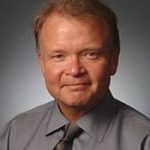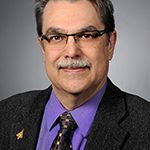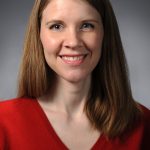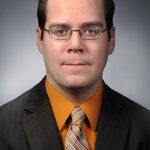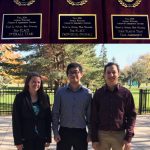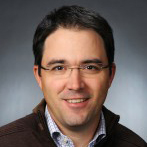Researchers are using remote sensing technologies to increase the health and efficiency of livestock production. One of the studies involved tracking chickens to get a sense of the basics for potential cage-free production. How many feeders to provide a cage-
free flock is one of the many production questions that need answering, says Hongwei Xin, director of …Continue reading “Monitoring animal health”
David Grewell has his thumb on the pulse of industry. He also has a unique approach to problem solving, which he uses in his research and encourages among his students. A professor of agricultural and biosystems engineering, Grewell brings a wealth of real-world experience to the next generation of industry professionals. His goal is to see …Continue reading “Welding industry tech to student opportunities”
Rachel Lenz found her senior capstone project in agricultural systems technology to be a perfect fit for her passion and skill set. Lenz and her team are creating a land management plan for the Des Moines International Airport to identify which conservation practices are best suited to their 800 acres of land. Her team has designed a …Continue reading “Conservation rising to new heights”
“You can observe and measure phenotype, but it has been mostly done manually,” Tang says. “We see more and more automated applications to help scientists collect data. With the Enviratron we can probe the plant with very high precision using the robotic arm’s advanced imaging and sensors.”
The U.S. News and World Report named Iowa State’s agricultural and biosystems undergraduate program number one among all national universities and first among public universities this September—a tie with Purdue University. Iowa State was ranked number two last year.
Going against almost all other industry currents, farming retirements exist only on paper, echoes Charles Schwab, a professor of agricultural and biosystems engineering at Iowa State University. “Farmers keep working at some level and you see these injuries mount. We’ve recorded so many farm injuries with 70- and 80-year-olds and that makes agriculture so different.”
From the air or highway, America’s fruited plains present a uniform vista of vast abundance. Not to Amy Kaleita. The associate professor of agricultural and biosystems engineering at Iowa State University sees a “nonlinear, somewhat chaotic” array of micro-plots, each with unique hydrology, root depths, soil characteristics – and ripe opportunities for smart technology to …Continue reading “Amy Kaleita: Soil Whisperer”
Daniel Andersen, Iowa State University assistant professor in Agricultural and Biosystems Engineering specializing in Manure Management, recently addressed questions of how manure moves through the soil profile in a recent edition of his blog “The Manure Scoop.” Andersen, aka Dr. Manure, explains that there are some factors at play that determine how manure filters down — …Continue reading “Andersen: Understanding manure flow is a piece of cake”
Three agricultural and biosystems engineering graduate students attended the 2016 Intercollegiate Animal Welfare Judging and Assessment Contest, held at Ohio State University on November 12 and 13. The Iowa State University graduate team, comprised of Suzanne Leonard, Kai Liu and Jofran Oliveira, placed first in the Team Live Assessment scenario and third place Overall Team. Suzanne Leonard …Continue reading “ABE grads win at Animal Welfare Judging and Assessment Contest”
When manure is disturbed or agitated, H2S is released into the air “in bursts,” says Dan Andersen, ag and biosystems engineering professor at Iowa State University. Air concentrations can increase a thousand-fold, reaching deadly levels within seconds.
Anhydrous ammonia is a popular farm fertilizer because it’s highly concentrated and cheaper than other options, said Mark Hanna, extension agricultural engineer at Iowa State University.
By popular demand Dr. Matt Helmers set out to address some of the common questions, and sometimes misconceptions, about nitrate loss and drainage in this month’s Iowa Learning Farms webinar. Helmers is the Dean’s Professor in the College of Agriculture and Life Sciences and Professor in the Department of Agricultural and Biosystems Engineering at Iowa …Continue reading “Q&A: Nitrate reduction and drainage with Iowa State’s Matt Helmers”
Two Iowa State University professors have been appointed to serve on the Agricultural Science Committee of the Environmental Protection Agency’s Science Advisory Board. Catherine Kling, Charles F. Curtiss Distinguished Professor of economics, and Matthew Helmers, professor of agricultural and biosystems engineering, were nominated to the committee and agreed to serve starting Oct. 1.
